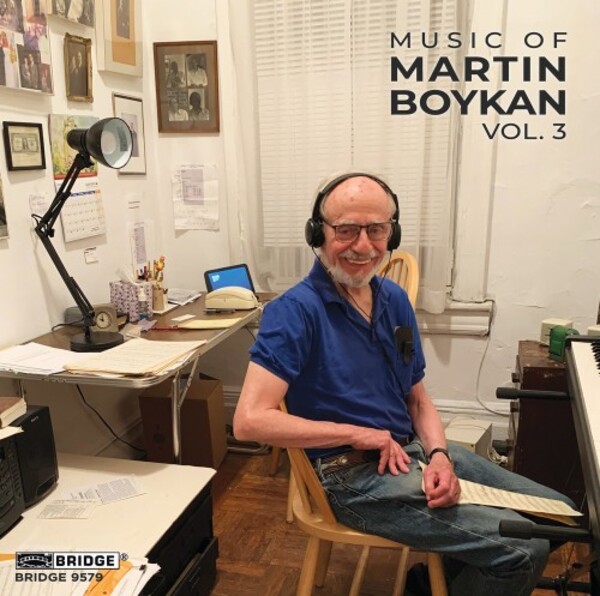Music of Martin Boykan Vol 3
View record and artist detailsRecord and Artist Details
Genre:
Chamber
Label: Bridge
Magazine Review Date: 07/2024
Media Format: CD or Download
Media Runtime: 71
Mastering:
DDD
Catalogue Number: BRIDGE9579

Tracks:
| Composition | Artist Credit |
|---|---|
| Piano Trio No 1 |
Martin Boykan, Composer
Nicole Cariglia, Cello Yoko Hagino, Piano Yonah Zur, Violin |
| Romanza for Flute and Piano |
Martin Boykan, Composer
Steven Weigt, Piano Sue-Ellen Hershman-Tcherepnin, Flute |
| Soliloquies for an Insomniac |
Martin Boykan, Composer
Donald Berman, Piano Pamela Dellal, Mezzo soprano |
| Nocturne |
Martin Boykan, Composer
Joshua Gordon, Cello Robert Schulz, Percussion Steven Weigt, Piano |
| Piano Sonata No 4 |
Martin Boykan, Composer
|
| Piano Trio No 4 |
Martin Boykan, Composer
Jennifer Choi, Violin Julia Den Boer, Piano Seth Parker Woods, Cello |
Author: Richard Whitehouse
Best known for his writings on music (notably The Power of the Moment; Pendragon Press: 2011), Martin Boykan (1931-2021) was an esteemed teacher and composer – the quality of his output out of proportion to its size, as is confirmed by this third instalment from Bridge.
Eminently suited to such things it may be, the cello in Nocturne (1991) pursues its rumination only intermittently owing to the animated roles of piano and percussion. Lyricism of the most capricious kind is the watchword of Romanza (1999) for flute and piano; as might equally be said of the song-cycle Soliloquies for an Insomniac (2008) in its deft traversal from the confiding tone of WS Merwin, via the ominous marine images of Wallace Stevens and rarefied poise of Goethe (as idiomatically translated by Boykan), to the yearning resignation of Philip Sidney. Nor is there any tangible leave-taking in the Fourth Piano Sonata (2016) that was Boykan’s last work – the halting eloquence of its Elegy (in memoriam Milton Babbitt) being framed with tensile Toccata movements then by a speculative Prologue and a pellucid Epilogue.
By his own admission, Boykan doubted the medium until writing his First Piano Trio (1975), which unfolds a finely honed trialogue whose purposefulness only becomes more confrontational towards the close. By contrast, the two continuous movements of the Fourth Piano Trio (2014) seek out an unlikely yet audible equilibrium which overrides their relative stasis then dynamism as surely as it brings about a warmly confiding conclusion.
Excellent performances from musicians who mostly worked with Boykan at first hand, plus fine sound and personable annotations from pianist and conductor Scott Wheeler, make for a persuasive introduction to the composer. Do also investigate the earlier releases in this series that feature Boykan’s piano music and chamber works (7/17US).
Discover the world's largest classical music catalogue with Presto Music.

Gramophone Digital Club
- Digital Edition
- Digital Archive
- Reviews Database
- Full website access
From £8.75 / month
Subscribe
Gramophone Full Club
- Print Edition
- Digital Edition
- Digital Archive
- Reviews Database
- Full website access
From £11.00 / month
Subscribe
If you are a library, university or other organisation that would be interested in an institutional subscription to Gramophone please click here for further information.




